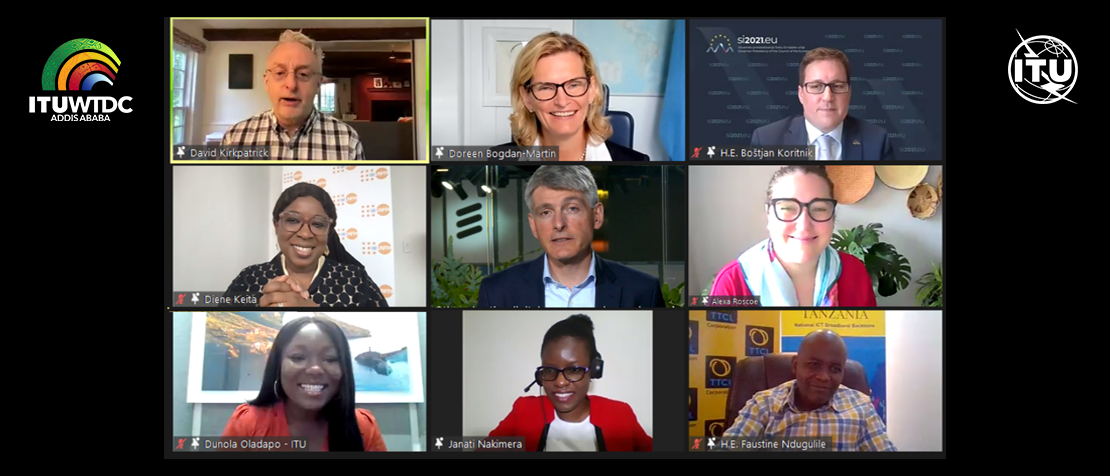
Digital development through entrepreneurship-driven innovation
The world’s poorest nations often lack access to opportunities, or even formal education, but they are brimming with ingenuity, talent, and entrepreneurial drive. Challenging circumstances tend to nurture innovators who instinctively learn sophisticated problem-solving skills to manage day-to-day life.
To Diene Keita, Deputy Executive Director of the United Nations Population Fund (UNFPA), “innovation is a major game changer to accelerate progress of the 2030 Agenda.”
Entrepreneurial energy
UNFPA engages strategically not only with like-minded organizations but also with those that think differently. “This allows us to move towards thinking as co-creators and to build joint successes with partners and leverage innovative financing for the Sustainable Development Goals. Innovating for us is using digital technologies to ensure that people get the level of development that they need,” Keita explains.
“Paring this huge store of entrepreneurial energy with the power and reach of digital can be the transformational force we need to advance global development by leaps and bounds,” notes Doreen Bogdan-Martin, Director of ITU Telecommunication Development Bureau.
Infrastructure at the heart of innovation
The COVID-19 pandemic has demonstrated that local innovation cannot be spearheaded without properly built infrastructure, remarks Erik Ekudden, Chief Technology Officer at Ericsson.
“Basically, you have your private, virtual network on top of the infrastructure built by operators,” he explains. This setup enables innovators to “generate revenue and create services that have higher performance.”
Missing critical infrastructure inspired young entrepreneur Janati Nakimera to co-found Solar Net Metering, an energy firm in her native Uganda.
She estimates that more than 70 per cent of the population is currently off the national electricity grid hindering the country’s growth.
“My major goal was to help the government to expand access to electricity,” Nakimera explains. “I installed solar systems on different households and designed net metering building systems to enable producers of that solar energy to sell the excess energy back to the grid for distribution to another client.”
Supporting young entrepreneurs
The government of Tanzania has started opening software centres and innovation hubs where young entrepreneurs can develop digital skills, present their ideas, and further develop them in cooperation with the private sector, recounts Faustine Ndugulile, Tanzania’s Minister of Communication and Information Technology.
The government is investing heavily in building fibre optic cables to achieve 80 per cent Internet coverage by 2025. According to Ndugulile, Internet coverage in Tanzania exceeds 66 per cent, but usage remains below 30 per cent.
“All this is meaningless if young people cannot afford [ICT] devices,” he points out.
“In the current budget we removed all taxes on laptops, smartphones, modems, and tablets, hoping that it will drive down the prices of devices.”
With digital transformation topping his country’s agenda for the Presidency of the European Union, Minister of Public Administration of Slovenia Boštjan Koritnik firmly believes that innovation is a driver of opportunities.
“Entrepreneurs and small and medium enterprises are an important source of economic growth, job creation, and innovation, especially when it comes to big data, 5G, cloud computing, the Internet of Things, and artificial intelligence,” he notes, highlighting European Union’s plans to “support closer collaboration of large companies with SMEs and start-ups.”
Reaching those furthest behind
Alexa Roscoe, Disruptive Technologies Lead at the International Finance Corporation, argues that one of the best ways to drive innovation is to make sure that the needs or ideas of underserved groups are brought to the foreground. “Addressing these underserved groups both drives business and development impact,” she observes.
The importance of diversity and inclusion for innovation was confirmed in a study by the International Finance Corporation, which found that mixed-gender investment teams had better return on investment outcomes.
Their performance scored, between 10 and 20 per cent higher than all-male or all-female teams, Roscoe notes.
“Success lies in keeping our focus firmly on people,” Bogdan-Martin highlights. “We need to work collaboratively with grassroots entrepreneurs and communities, recognizing that they can teach us at least as much as we can teach them. We do need to empower people in communities with the means to innovate for themselves.”
Next stop on the Road to Addis
ITU’s Road to Addis discussion series aims to build awareness, engage key stakeholders and communities, and provide an inclusive platform to discuss some of the key themes that will be addressed at the next World Telecommunication Development Conference (WTDC), which will be held in Addis Ababa, Ethiopia, from 6 to 15 June 2022.
It focuses on six enablers of connectivity for sustainable development: partnerships, inclusion, financing, leadership, innovation, and youth.
The next event in the series, Youth2Connect, takes place on 12 August.
